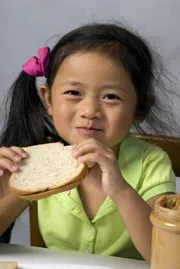“Maggie’s parents send her sushi.”
“Sam brings chocolate cookies — enough for the whole class.”
Making school lunch for my three kids was always the biggest drudge of my week. My husband and I hated that it was so boring and time consuming. But most of all we resented that we were forced, by our children, to be creative each and every day. There was no end to the seemingly remarkable school lunches with which we had to compete.
Then about three years ago, it occurred to us that at 7, 9 and 11 years old, our children were capable of making their own lunches. We were free! Why hadn’t we thought of this before?
We plotted the transition and then explained it to them: “We’ll teach you how and then it’s up to you. We’ve been doing it long enough. Now it’s your turn.”
At first they balked. They didn’t want to inherit the drudgery and responsibility. Who could blame them? But we insisted.

We began providing easy-to-manage, healthy foods that we knew they liked, and we coached them through it for a week or two. After that they were on their own (except for the occasional help with cutting fruit and other foods requiring a sharp knife). It was working! Not only were we relieved of the school lunch-making burden, but since our children had started making their own lunches, we hadn’t heard a single complaint about everyone else’s lunch being so much better!
They were learning an important life lesson: gaining the skills to take care of your own needs in life is far more satisfying than having to rely on someone else to do it for you. In fact, the more you need to rely on others, the more you criticize their ability to satisfy you. This is because you are not in control and you resent it. Take care of yourself and you have only yourself to thank for your success or blame for your failure.
As parents, we must create a thirst for knowledge in our children, and a motivation to learn new skills. We need to encourage them to want to be in charge of their lives. We can do so by constantly challenging and teaching them. The less we do for them and the more we urge them to do for themselves, the more confidently they will learn to be independent.
Perfection is not the goal — it is accomplishment that you should seek. It doesn’t matter if an outfit is mismatched, if toast is slightly burned, or if an order at the deli counter is conveyed a bit more slowly or clumsily than you’d prefer. Your child is learning life skills that will empower him to eventually live completely independently of you. In fact, it is important that any ambivalence you feel about your child’s growing independence doesn’t interfere with teaching him the skills he needs.
It is hard to let a child go — even gradually. I feel it every day. But it’s so much better than making school lunch.
DR. SUSAN BARTELL is a nationally recognized child, teen and parenting psychologist and award-winning author, based in Port Washington. Her latest book is Dr. Susan’s Kids-Only Weight Loss Guide: The Parent’s Action Plan for Success. Find out more at www.drsusanbartell.com.






















